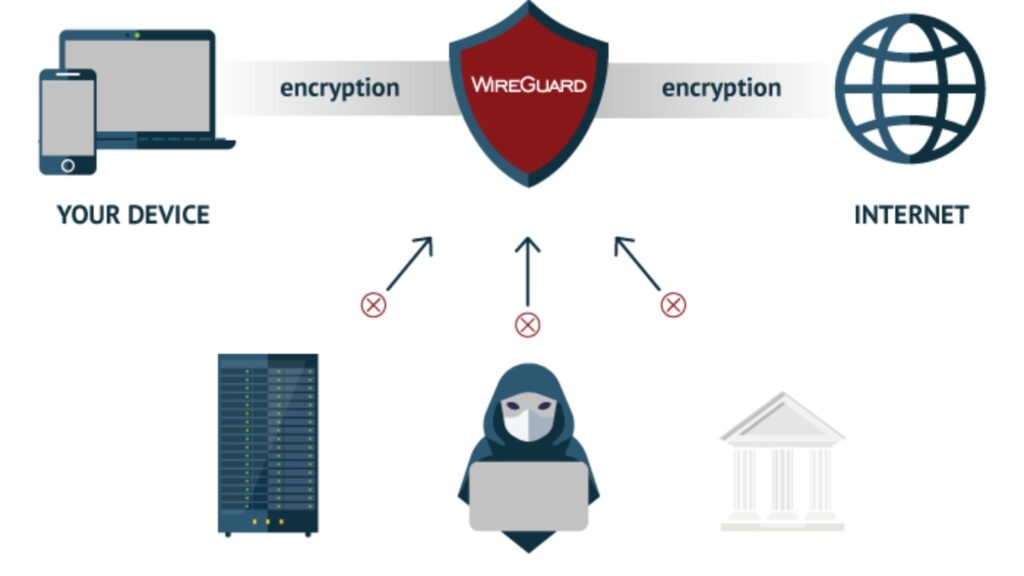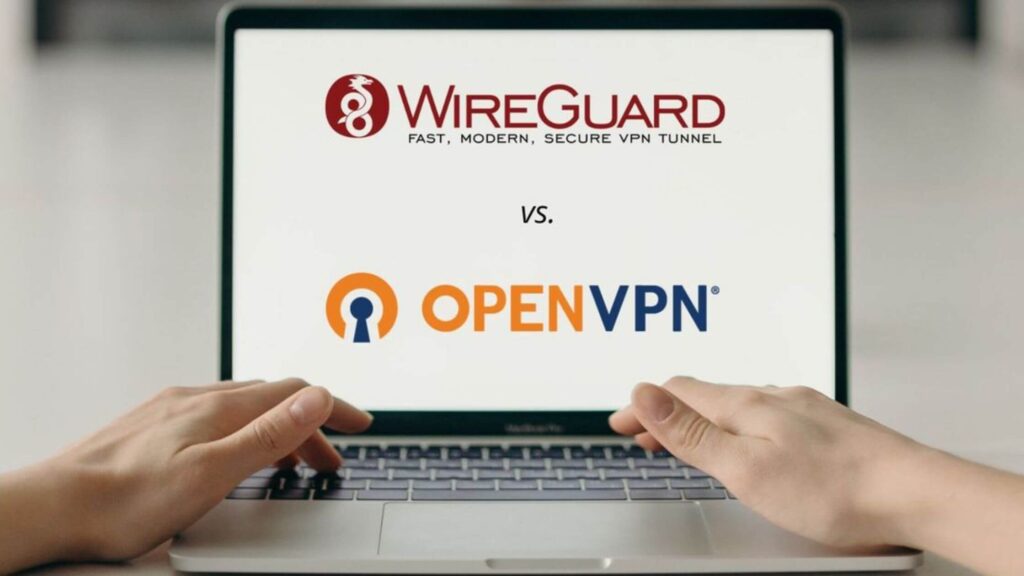WireGuard is a cutting-edge open-source protocol designed for creating secure Virtual Private Networks (VPNs). By using advanced cryptographic techniques, it ensures that data exchanged over the network is tightly secured within an encrypted tunnel.
Known for its simplicity, efficiency, and robust security, WireGuard has quickly gained recognition as one of the strongest VPN protocols available. In this blog post, we’ll cover what makes a WireGuard VPN so powerful and user-friendly. We’ll also explore how it works, and why it’s considered a game-changer in the VPN world.
Key Takeaways
- WireGuard VPN uses state-of-the-art cryptographic techniques like ChaCha20 and Poly1305 for encryption and authentication.
- WireGuardVPN operates efficiently across multiple platforms, including Linux, Windows, macOS, iOS, and Android.
- WireGuard’s lightweight design reduces potential security vulnerabilities.
- Compared to OpenVPN, WireGuard is faster but less flexible in terms of encryption and geolocation options.
What Is the Wireguard VPN Protocol?
WireGuard is a modern, efficient, and highly secure VPN protocol that stands out for its simplicity and speed.
Unlike other VPN protocols like IPsec and OpenVPN, WireGuard is designed to be lean and fast while utilizing state-of-the-art cryptographic techniques.
Initially developed for the Linux kernel, WireGuard is now available across multiple platforms, including Windows, macOS, BSD, iOS, and Android, making it versatile and widely deployable.

Pros & cons
WireGuard is one of the most secure and efficient VPN protocols available, with standout features in speed, security, and simplicity. Here’s a more detailed breakdown of WireGuard’s strengths, along with some statistics, figures, and an overview of its pros and cons.
Pros
- Exceptional Speed: Up to 4 times faster than many traditional VPN protocols, ideal for gaming, streaming, and data-intensive tasks.
- High Security: Uses state-of-the-art cryptography (ChaCha20, Poly1305) for strong, reliable encryption.
- Minimal Codebase: With only 4,000 lines of code, WireGuard is easy to audit and less prone to security vulnerabilities.
- Ease of Use: Simple configuration and management reduce the complexity for users and administrators.
- Power and Data Efficiency: Lower power consumption and data overhead, which improves performance on mobile devices.
Cons
- Lacks Built-in Support for Dynamic IPs: WireGuard requires manual configuration for dynamic IPs, which can be inconvenient for users needing frequent IP changes.
- No Native Network Roaming Support: Unlike IKEv2, WireGuard doesn’t seamlessly reconnect when switching networks (e.g., moving from Wi-Fi to cellular data), making it less ideal for mobile users.
- Privacy Concerns: WireGuard stores user IP addresses temporarily, which can present privacy concerns, although many VPN providers address this by implementing temporary IP addresses or custom solutions.
Is The WireGuard Protocol Important?
Yes, the WireGuard protocol is important for securing internet connections because it offers a faster, more efficient, and simpler solution for VPN security compared to older protocols like OpenVPN and IPSec.
WireGuard is often up to 3-4 times faster than OpenVPN due to its lean codebase and streamlined design, making it one of the fastest VPN protocols available. Its smaller codebase of around 4,000 lines (compared to OpenVPN’s nearly 100,000 lines) enhances both performance and security.
It minimizes data exposure by using state-of-the-art cryptography. It’s constantly updated with advanced encryption methods like ChaCha20, Poly1305, and BLAKE2s, which are among the most secure and performant cryptographic algorithms today.
A growing number of VPN providers, including top names in the industry, have implemented WireGuard due to its combination of security and speed. As of recent data, more than 50% of VPN providers offer WireGuard, showing the industry’s move toward modern, efficient protocols.
How Does Wireguard VPN Protocol Work?
WireGuard VPN works by creating a secure link between your device (like your phone or computer) and a VPN server. This link, called a tunnel, encrypts the data moving between your device and the server, keeping your online activities private and safe.
Here’s how it works in simple terms:
- Setting Up the Connection: When you turn on WireGuard VPN, your device “talks” to the VPN server. They exchange keys to confirm each other’s identity and establish a secure connection.
- Encrypting Data: Once connected, all data from your device gets encrypted before being sent. WireGuard uses the ChaCha20 encryption method, which is faster than the more common AES-256 method. This speed comes from using shorter, more efficient cryptographic keys.
- Running in the Kernel: Unlike many other VPNs, WireGuard operates directly within the Linux kernel on servers and desktops. This means it works faster because it doesn’t need to switch between different parts of the computer’s memory.
- Advanced Cryptography: WireGuard uses modern cryptographic techniques to keep data secure:
- ChaCha20 for fast encryption,
- Poly1305 for authentication,
- Curve25519 for secure key exchanges,
- SipHash24 and BLAKE2 for secure hashing
- HKDF for deriving cryptographic keys.
- Perfect Forward Secrecy: WireGuard frequently updates the keys used to encrypt data. This means that even if a key is compromised, it can’t be used to decrypt past or future data.
- Efficient Data Handling: WireGuard minimizes data loss during connection setups by using separate data queues for each host. This keeps data transmission smooth and uninterrupted.

WireGuard stands out because it’s fast, secure, and simple. Its lightweight design and modern encryption methods make it one of the quickest and most reliable VPN protocols available.
Whether you’re browsing the web, streaming videos, or using apps, WireGuard keeps your data protected and your online activities private.
Compare Two Best VPN Protocols: Wireguard VPN Vs OpenVPN
When choosing a VPN protocol, WireGuard and OpenVPN are two of the top contenders. The main difference between WireGuard and OpenVPN is that WireGuard is much faster, while OpenVPN allows for higher privacy.
Another important difference is that OpenVPN gives you a choice of encryption algorithm, whereas WireGuard forces you to use ChaCha20 for encryption and Poly1305 for authentication. Here’s a comparison to help you decide which one suits your needs better:
1. Speed
- WireGuard VPN: WireGuard is renowned for its speed. It connects quickly and transfers data efficiently, making it one of the fastest VPN protocols available.
- OpenVPN: While OpenVPN is fast, it doesn’t match the speed of WireGuard. However, it still performs well in most scenarios.
2. Data Overhead
- WireGuard VPN: WireGuard has a smaller data overhead compared to OpenVPN. This means it uses less extra data to maintain the connection, leading to better performance.
- OpenVPN: OpenVPN has a larger data overhead, which can slow down the connection slightly compared to WireGuard.
3. Codebase
- WireGuard: WireGuard is very concise, with about 4,000 lines of code. This makes it easier to audit and less prone to security issues.
- OpenVPN: OpenVPN has a much larger codebase, around 70,000 lines of code. This complexity can make it harder to audit and maintain.
4. Encryption
- WireGuard VPN: WireGuard uses the ChaCha20 encryption algorithm, which is modern and fast. However, it doesn’t allow you to choose your encryption method.
- OpenVPN: OpenVPN is highly flexible with encryption. It supports both well-established algorithms like AES and newer ones like ChaCha20, giving you more options to customize your security.
5. Compatibility
- WireGuard VPN: WireGuard is supported on many platforms but isn’t as widely compatible as OpenVPN. It’s great for Linux and has growing support for other systems.
- OpenVPN: OpenVPN is supported on nearly all devices and operating systems, making it highly versatile and widely used.
6. Privacy
- WireGuard VPN: WireGuard requires storing the user’s IP address on the server, which could be seen as a privacy concern. However, it’s designed to minimize the risks.
- OpenVPN: OpenVPN does not store user IP addresses, offering better privacy in this regard.
7. Obfuscation
- WireGuard VPN: WireGuard doesn’t include obfuscation features, making it easier to detect as a VPN.
- OpenVPN: OpenVPN can use obfuscation to hide the fact that you’re using a VPN, which can help bypass network restrictions and censorship.
8. Mobility
- WireGuard VPN: WireGuard excels in mobile environments, handling network changes smoothly and maintaining stable connections.
- OpenVPN: OpenVPN can have issues when switching networks, but it generally offers reliable support for mobility.
9. Geolocation Flexibility
- WireGuardVPN: WireGuard does not allow changing the server location easily, limiting your ability to access content from different regions.
- OpenVPN: OpenVPN offers extensive server location options, helping you bypass geo-restrictions effectively.

Here’s a comparison table for WireGuard VPN and OpenVPN:
| Feature | WireGuard | OpenVPN |
| Speed | Very fast | Fast, but slower than WireGuard |
| Data Overhead | Smaller data overhead | Larger data overhead |
| Codebase | 4,000 lines, easier to audit | 70,000 lines, more complex |
| Encryption | Uses ChaCha20, fast but inflexible | Supports AES and ChaCha20, highly flexible |
| Compatibility | Good for Linux, growing support for other platforms | Widely supported on nearly all devices |
| Privacy | Stores user IP address | Does not store user IP addresses |
| Obfuscation | No obfuscation | Includes obfuscation features |
| Mobility | Excellent for mobile networks | Reliable but may have issues when switching networks |
| Geolocation Flexibility | Limited server location options | Extensive server location options |
Compare Two Best VPN Protocols: Wireguard VPN Vs IKEv2
Both WireGuard and IKEv2 are leading VPN protocols with unique strengths across security, performance, and usability. Here’s how they stack up:
1. Performance
- WireGuard: Outperforms many protocols in speed due to its streamlined code, making it a fast choice for VPN users.
- IKEv2: Known for maintaining high speeds, IKEv2 excels in re-establishing connections quickly, especially helpful for mobile users who often switch networks.
2. Compatibility
- WireGuard: Initially Linux-focused, but now supported on Windows, macOS, iOS, and Android. Some platforms may require additional setup.
- IKEv2: Offers native support across major platforms, including Windows, macOS, iOS, and Blackberry, making it widely compatible.
3. Security
- WireGuard: Uses advanced cryptography, including ChaCha20 and Poly1305, to deliver cutting-edge security.
- IKEv2: Known for using established encryption standards like AES and SHA-2. However, its complexity can introduce potential vulnerabilities if not properly implemented.
WireGuard shines with its modern design, high speeds, and strong cryptographic standards, ideal for users who prioritize cutting-edge tech and performance. IKEv2 remains a reliable choice with stability and mobility support, making it great for mobile and enterprise use.
Which VPNs Using Wireguard Are Worth Choosing?
Most of the leading VPNs have addressed the WireGuard VPN protocol’s privacy issues and added WireGuard support.
TurisVPN stands out as a leading VPN service that has fully integrated the WireGuard protocol into its platform.
WireGuard’s efficient protocol design ensures that TurisVPN provides faster connection speeds, making streaming, gaming, and browsing a breeze. With WireGuard, TurisVPN reduces latency, enhancing the overall user experience, especially for real-time activities like video calls and online gaming.
TurisVPN employs advanced encryption methods with WireGuard, ensuring your data remains secure and private. Their IP-2Hop feature routes your traffic through two servers, providing double the IP masking for enhanced privacy and security.
TurisVPN is an audited no-logs VPN provider, meaning they do not store any data about your online activities, ensuring complete anonymity.

WireGuard’s streamlined codebase allows for a straightforward setup, making TurisVPN user-friendly even for those new to VPNs. TurisVPN is compatible with a wide range of devices, including iOS, Android, Windows ensuring you can protect all your gadgets.
Whether you’re looking to enhance your online privacy, access global content, or simply enjoy faster internet connections, TurisVPN is a top choice worth considering.
Bottom Line
WireGuard Protocol is a fast, modern VPN protocol that offers strong security and excellent performance.
If you’re looking for a reliable VPN that uses WireGuard, TurisVPN is a top pick. It combines the speed and security of WireGuard with advanced features like IP-2Hop for double the privacy. Plus, it’s easy to use and works on all your devices.
Choosing TurisVPN means you’ll get a faster, more secure, and user-friendly VPN experience, perfect for streaming, and keeping your online activities private.






